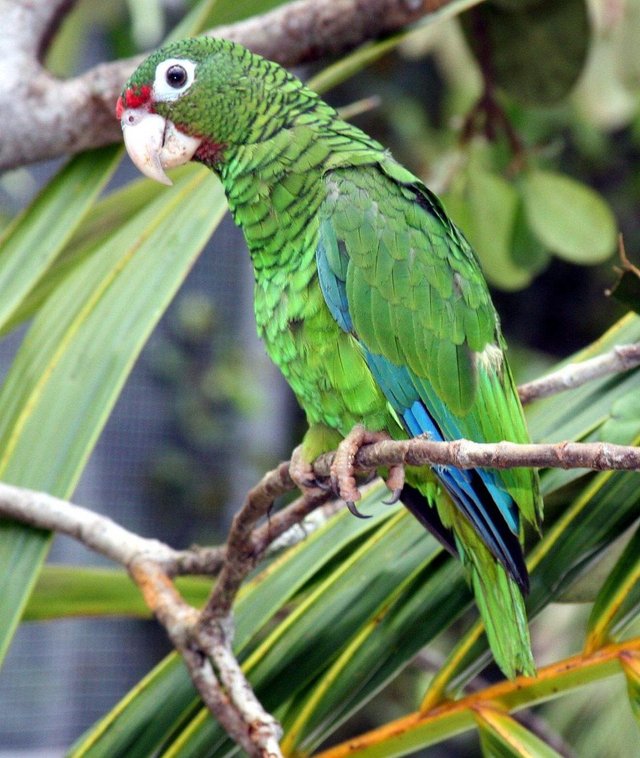The USFWS is continuing its commitment to conserve the critically endangered Puerto Rican Amazon parrot by providing $11 million in funding to support captive-breeding efforts.

A Puerto Rican Amazon parrot, or Iguaca (Amazona vittata), peers at the photographer.
(Credit: Pablo Torres / USFWS, Southeast Region / Public domain.)Pablo Torres via a Creative Commons license
Well, this is certainly unexpectedly good news. It turns out that the United States Fish and Wildlife Service (USFWS) recently granted $11 million to the Puerto Rico Parrot Recovery Program at the Department of Natural and Environmental Resources (DNER), according to DNER secretary, Tania Vázquez Rivera.
These funds arrive almost one year after two catastrophic hurricanes, Irma and Maria, devastated Puerto Rico just two weeks apart in September 2017. In addition to severely damaging the captive breeding facilities, these hurricanes stripped the forests that the wild parrots live in, toppled the trees that they nest in, and killed nearly half of this critically endangered parrot’s wild population.
Fortunately, all of the 174 captive parrots at the José L. Vivaldi Memorial Aviary at Río Abajo Forest Reserve, Utuado, and most of the 230 captive parrots at the Iguaca Aviary at El Yunque National Forest, survived the storms, although El Yunque’s wild flock -- which numbered 50 to 55 parrots before the hurricane -- vanished. But another flock at Río Abajo mostly survived.
“After talks and meetings at the headquarters of the federal agency in Atlanta, we have achieved this allocation that is vital for the recovery of this species,” Ms. Vázquez Rivera said in a press release.
These funds will allow The Project to rebuild, repair and upgrade its infrastructure with hurricane-resistant buildings, aviaries and flight cages, as well as improve its conservation efforts for this critically endangered parrot.
“The project has been looking for more than 40 years to reduce the extinction [risk] of the Puerto Rican parrot that is so emblematic for all of us,” Ms. Vázquez Rivera said. “These funds [will] increase the success rate of the program for the reproduction and reintroduction of individuals to the wild.”

A Critically Endangered Puerto Rican Amazon parrot, or Iguaca (Amazona vittata), in a flight cage at the Iguaca Aviary at El Yunque National Forest.
(Credit: Tom MacKenzie / USFWS / Public domain.)Tom MacKenzie via a Creative Commons license
Historically, these parrots were widespread and abundant throughout mature or old-growth forests at all elevations in Puerto Rico and on several smaller nearby islands, but destruction of most of its habitat and poaching in the 19th and early 20th centuries dramatically reduced and fragmented its population from a million or more individuals to a mere handful. The parrot was listed as endangered and conservation efforts began in 1968 to keep the species from going extinct. By 1975, the Puerto Rican parrot’s total population had plunged to its all-time low of just 13 individuals.
Despite its close brush with extinction, the Puerto Rican parrot is currently an ongoing success story for the Endangered Species Act as well as for the USFWS’s conservation efforts. In 2012, the total estimated population was 58–80 individuals in several wild populations in El Yunque and the Río Abajo state forest, and over 300 individuals in several captive-breeding facilities (ref) and at an acclimation/release facility at Maricao.
According to Ms. Vázquez Rivera, $9.7 million of the funds will go to the José L. Vivaldi Memorial Aviary, in Utuado, and $1.9 million will go to the Maricao facility, which had been so badly damaged by the hurricanes that all the birds there had to be relocated to other facilities.
Source:
Manuel Crespo Feliciano. Millonaria asignación de fondos para la preservación de la cotorra puertorriqueña, AccuWeather, 25 July 2018 (link in Spanish only)
Hi! I am a robot. I just upvoted you! I found similar content that readers might be interested in:
https://www.forbes.com/sites/grrlscientist/2018/07/29/us-fish-and-wildlife-provides-funding-to-help-conserve-the-puerto-rican-parrot/
Downvoting a post can decrease pending rewards and make it less visible. Common reasons:
Submit